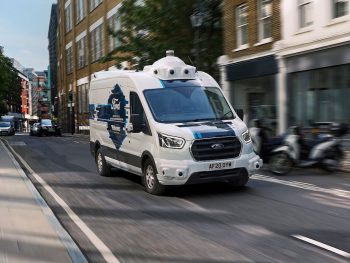Delivery firm Hermes has become the first customer to operate a Ford research vehicle as part of a pilot into ‘last-mile’ deliveries.

The business is using a customised Ford Transit to explore how its teams could work alongside driverless vehicles in the future, integrating them into its operations.
While drivers would normally play an active role in handing over parcels, in the research they simply drive the vehicle and parcel deliveries are taken over by pedestrian couriers. The couriers can hail the vehicle and remotely unlock the load door using a smartphone app. Once inside, voice prompts and digital screens direct the courier to their locker, containing the parcels to be delivered.
The research also simulates self-driving vans by using customised Ford Transits with sensors to mimic the look of an autonomous vehicle plus a special ‘Human Car Seat’ that conceals the driver, assessing pedestrians’ and cyclists’ interaction with vehicles.
“We’re excited to collaborate with Ford on this proof of concept trial, which is all about understanding the potential for autonomous vehicles and if they have a role in delivery in the longer-term future,” said Lynsey Aston, head of product, innovation and onboarding at Hermes. “We’re constantly innovating to incubate and then explore concepts like this, and we look forward to the initial findings, which will no doubt be useful on an industry-wide level.”
It’s part of Ford’s Self-Driving Vehicle Research Programme which works with customers to better understand how autonomous vehicles integrate into their business. The business is planning to invest around $7bn (£5bn) in autonomous vehicles over 10 years through 2025, including investment in self-driving technology partner Argo AI.
The two-week research project with Hermes builds on the success of Ford’s ‘last-mile delivery’ trials in London, in which a team of pedestrian couriers collects parcels from a delivery van and fulfils the last leg of the delivery by foot – this can enable fast, sustainable and efficient deliveries in cities.
“As we plan to bring autonomous vehicles to the roads, it is important that we focus not only on enabling the technology, but on enabling our customers’ businesses,” said Richard Balch, director, autonomous vehicles and mobility, Ford of Europe. “Clearly, there is no better way to identify how they may need to adapt than to experience those processes in real life.”

